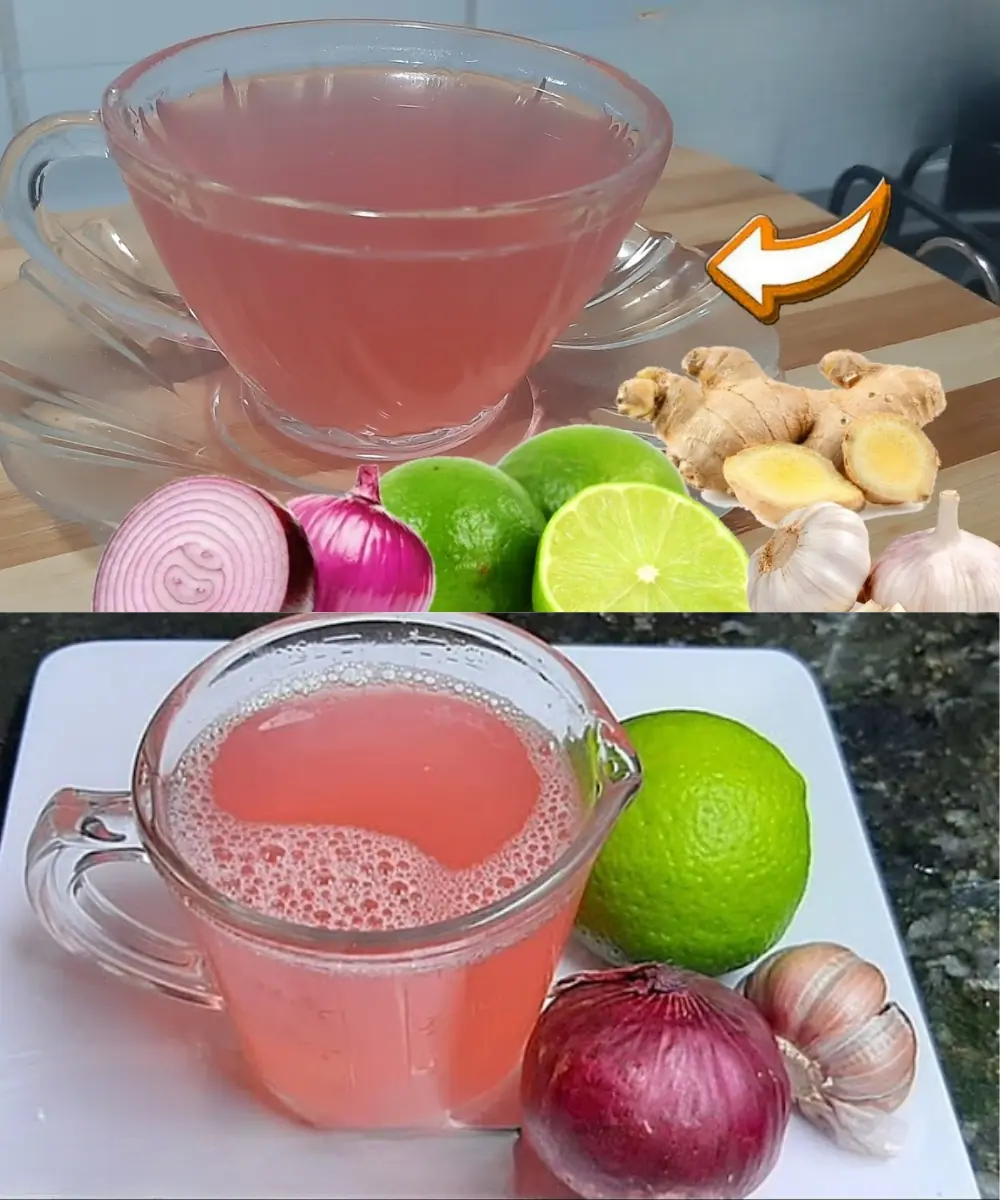
Over 60? Drink These 3 Teas to Rebuild Muscle and Walk Strong Again
Aging doesn’t have to mean weakness, stiffness, or giving up the activities you love. Did you know that after the age of 60, the average person loses up to 30% of their muscle mass if no action is taken? This condition, known as sarcopenia, affects balance, mobility, and independence. But here’s the good news: while exercise and protein-rich foods are crucial, certain herbal teas may also play a supportive role in muscle recovery, circulation, and energy.

For centuries, cultures around the world have relied on natural teas to maintain strength and vitality in later years. Modern research is now exploring how these teas may help older adults protect muscle and move with confidence. In this article, we’ll look at three teas worth adding to your daily routine if you’re over 60 and want to rebuild muscle and walk strong again.
Why Muscle Strength Declines After 60
Muscle loss in older adults is influenced by several factors:
- Lower activity levels: Less physical exercise reduces stimulation for muscle growth.
- Hormonal changes: Testosterone, estrogen, and growth hormone naturally decline.
- Nutrient absorption: The body becomes less efficient at absorbing protein, calcium, and vitamin D.
- Chronic inflammation: Low-grade inflammation can break down muscle tissue over time.
While lifestyle changes like strength training and a balanced diet are first-line solutions, supportive beverages like herbal teas can add another layer of benefit—especially those rich in antioxidants, anti-inflammatory compounds, and minerals.
Tea #1: Green Tea – The Antioxidant Powerhouse
Green tea is widely studied for its health benefits, and it may also play a role in muscle preservation.

- EGCG (epigallocatechin gallate): This potent antioxidant helps reduce oxidative stress, which contributes to muscle fatigue and breakdown.
- Fat metabolism support: Green tea may help the body use fat as fuel, sparing muscle during activity.
- Circulation booster: Better blood flow means improved delivery of oxygen and nutrients to muscles.
How to enjoy it:
- Drink 1–2 cups daily, preferably before or after a light workout or walk.
- Try adding lemon to enhance antioxidant absorption.
Tea #2: Ginger Tea – For Inflammation and Recovery
Ginger is more than a kitchen spice; it’s a powerful root with benefits for mobility and strength.

- Anti-inflammatory action: Gingerols and shogaols in ginger may reduce joint stiffness and muscle soreness after activity.
- Digestive support: Better digestion means more efficient absorption of protein and minerals essential for muscle repair.
- Circulation enhancer: Warming properties stimulate blood flow, nourishing muscles.
How to enjoy it:
- Simmer fresh ginger slices in hot water for 10 minutes.
- Add honey or a pinch of turmeric for extra anti-inflammatory support.
Tea #3: Rooibos Tea – Gentle Mineral Support
Rooibos, a naturally caffeine-free tea from South Africa, is rich in antioxidants and minerals.
- Bone and muscle support: Rooibos contains calcium, magnesium, and potassium, which are crucial for muscle contraction and bone strength.
- Reduced cortisol: Some studies suggest rooibos may help regulate stress hormones that can contribute to muscle breakdown.
- Caffeine-free energy: Perfect for evening relaxation without disrupting sleep—vital for muscle recovery.
How to enjoy it:
- Brew 1–2 cups daily, either hot or iced.
- Combine with cinnamon or vanilla for a comforting flavor.
Comparison of the 3 Teas

| Tea | Key Compounds | Main Benefits for 60+ | Best Time to Drink |
|---|---|---|---|
| Green Tea | EGCG, catechins | Muscle protection, circulation | Morning/afternoon |
| Ginger Tea | Gingerols, shogaols | Anti-inflammatory, recovery | Anytime, after activity |
| Rooibos Tea | Minerals, antioxidants | Bone strength, stress balance | Evening |
Making Tea Part of Your Muscle-Strengthening Routine
Tea alone won’t rebuild muscle—you need movement and nutrition too. Here are some tips to maximize results:
- Pair tea with exercise: Drink green tea before a walk or light strength session.
- Support digestion: Sip ginger tea after protein-rich meals to help your body use nutrients effectively.
- Recover at night: Wind down with rooibos tea after stretching or yoga.
- Stay consistent: Daily habits matter more than occasional cups.
Real-Life Inspiration
- Arthur, 68: “I started drinking green tea before my morning walks. I feel more energized and my legs don’t tire as quickly.”
- Linda, 72: “Ginger tea has been a game-changer for my stiff knees. I brew a pot after gardening and it helps me recover.”
- Marcos, 65: “Rooibos tea in the evenings helps me relax and sleep better. I noticed my back pain eases when I wake up.”
Conclusion: Stronger Steps Start with Simple Habits
If you’re over 60, muscle health is the foundation of independence and vitality. Along with exercise and good nutrition, teas like green tea, ginger tea, and rooibos tea can be simple yet powerful allies. They offer antioxidants, anti-inflammatory compounds, and minerals that support strength, resilience, and mobility—helping you walk strong again.
FAQ
Can these teas replace exercise for rebuilding muscle?
No. They support recovery and health but must be combined with regular activity and protein-rich meals.
How much tea should I drink daily?
1–3 cups per tea is safe for most people. Adjust based on tolerance and caffeine sensitivity.
Are there side effects?
Green tea contains caffeine, which may cause jitters. Ginger can cause mild heartburn in some people. Rooibos is generally safe but may interact with certain medications.
When will I notice results?
Benefits build over time. Most people notice improved energy and recovery within weeks if combined with healthy lifestyle habits.
Disclaimer: This content is for educational purposes only and should not replace professional medical advice. Always consult a qualified healthcare provider before making dietary or lifestyle changes.
News in the same category


Don’t Drink Coconut Water Before You Know These 11 Secrets!

Pumpkin Seed Milk — The Natural Parasite Cleanser

Fast Rice Water Trick for a Brighter Smile

Morning Drink to Revive Your Kidneys Fast

The Onion Recipe That Could Transform Your Blood Sugar, Support Cleaner Arteries, and Protect Your Heart!

Top 4 Fruits That Help Your Kidneys Flush Out Toxins While You Sleep

Ginger, Clove, and Honey: The Natural Trio Your Body Will Thank You For

Heal 15 Years of Joint Pain Naturally with Turmeric and Honey Tea

This Juice Revived My Grandma’s Energy — Say Goodbye to Fatigue and Body Pain with This Natural Recipe

I’m 66 but Look 36 — My Secret? Aloe Vera & Ginger for Firm, Smooth Skin

How to Make Okra Water to Treat 17 Health Problems Naturally

Banana and Egg Mask to Look Younger Even in Your 80s

Scent Leaf Secrets Unveiled: 10 Surprising Health Benefits of This Miracle Herb

From White Hair to Black Hair Naturally in Just 5 Minutes — Fast Hair Growth Remedy

Boost Your Immune System Year-Round with Garlic, Onion, and Lemon

When You Start Eating 2 Eggs Every Day, Here’s What Happens to Your Body (Is It BAD??)

13 Warning Signs Your Kidneys Are Failing – Don’t Ignore These Symptoms

Save Your Heart: 8 Foods to Naturally Lower Cholesterol

Silent Signs of Artery Blockages Seniors Can’t Ignore
News Post

WHAT HAPPENS WHEN WE TONGUE KISS…See more

Nature’s Secret: 4 Healing Leaves That Support Metabolism, Immunity & Circulation Naturally

Don’t Drink Coconut Water Before You Know These 11 Secrets!

Pumpkin Seed Milk — The Natural Parasite Cleanser

Fast Rice Water Trick for a Brighter Smile

Morning Drink to Revive Your Kidneys Fast

The Onion Recipe That Could Transform Your Blood Sugar, Support Cleaner Arteries, and Protect Your Heart!

Top 4 Fruits That Help Your Kidneys Flush Out Toxins While You Sleep

Ginger, Clove, and Honey: The Natural Trio Your Body Will Thank You For

Heal 15 Years of Joint Pain Naturally with Turmeric and Honey Tea

This Juice Revived My Grandma’s Energy — Say Goodbye to Fatigue and Body Pain with This Natural Recipe

The Benefits of Eating 2 Boiled Eggs Every Morning: Transform Your Health!

If Your Kidneys Are in Danger, Your Body Will Send You These 8 Signals — Don’t Ignore Them

The Surprising Effects of Avocado on Your Heart and Brain

Ways to Get Over a Man Who Didn’t Value You

I’m 66 but Look 36 — My Secret? Aloe Vera & Ginger for Firm, Smooth Skin

How to Make Okra Water to Treat 17 Health Problems Naturally

Banana and Egg Mask to Look Younger Even in Your 80s

Scent Leaf Secrets Unveiled: 10 Surprising Health Benefits of This Miracle Herb
